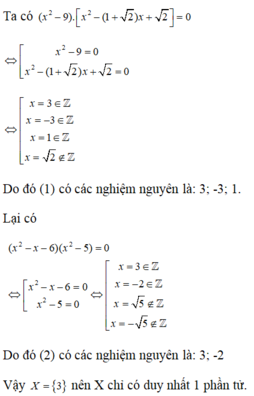2(x2 + \(1/x^2\)) - 5(x+\(1/x\)) + 6=0 (với x ≠ 0)

Những câu hỏi liên quan
Bài 1: Giải các pt sau: 1) x2 + 5x + 6 = 0 2)
x2 - x - 6 = 0
3) (x2 + 1) (x2 + 4x + 4) = 0
4) x3 + x2 + x + 1 = 0
5) x2 - 7x + 6 = 0
6) 2x2 - 3x - 5 = 0
7) x2 + x - 12 = 0
8) 2x3 + 6x2 = x2 + 3x
9) (3x - 1) (x2 + 2) = (3x - 1)(7x - 10)
Bài 2: Cho biểu thức A = (5x - 3y + 1) (7x + 2y -2) a) Tìm x sao cho với y = 2 thì A = 0 b) Tìm y sao cho với x = -2 thì A = 0
Bài 1: Giải các pt sau: 1) x2 + 5x + 6 = 0
2) x2 - x - 6 = 0
3) (x2 + 1) (x2 + 4x + 4) = 0
4) x3 + x2 + x + 1 = 0
5) x2 - 7x + 6 = 0
6) 2x2 - 3x - 5 = 0
7) x2 + x - 12 = 0
8) 2x3 + 6x2 = x2 + 3x
9) (3x - 1) (x2 + 2) = (3x - 1)(7x - 10)
Bài 2: Cho biểu thức A = (5x - 3y + 1) (7x + 2y -2) a) Tìm x sao cho với y = 2 thì A = 0 b) Tìm y sao cho với x = -2 thì A = 0
Bài 1)1)\(x^2+5x+6=x^2+3x+2x+6\)=0
=x(x+3)+2(x+3)=(x+2)(x+3)=0
Dễ rồi
2)\(x^2-x-6=0=x^2-3x+2x-6=0\)
=x(x-3)+2(x-3)=0
=(x+2)(x-3)=0
Dễ rồi
3)Phương trình tương đương:\(\left(x^2+1\right)\left(x+2\right)^2=0\)
Vì \(x^2+1>0\)
=>\(\left(x+2\right)^2=0\)
Dễ rồi
4)Phương trình tương đương\(x^2\left(x+1\right)+\left(x+1\right)\)=0
=> \(\left(x^2+1\right)\left(x+1\right)=0Vì\) \(x^2+1>0\)
=>x+1=0
=>..................
5)\(x^2-7x+6=x^2-6x-x+6\) =0
=x(x-6)-(x-6)=0
=(x-1)(x-6)=0
=>.....
6)\(2x^2-3x-5=2x^2+2x-5x-5\)=0
=2x(x+1)-5(x+1)=0
=(2x-5)(x+1)=0
7)\(x^2-3x+4x-12\)=x(x-3)+4(x-3)=(x+4)(x-3)=0
Dễ rồi
Nghỉ đã hôm sau làm mệt
Bài 4: Tìm x: 1) x2 - 9x 0 2) x(x - 4) – x2 7 3) 3x + 2(x – 5) 5 4) 25x2 - 1 0 5) 3x(x - 2) - 5(x - 2) 0 6) 3x(x - 7) + 4(x – 7) 0 7) 4x2 – 9 0 8) 10x(x - 4) + 2x - 8 0 9) x(2x - 5) - 2x2 0 10) 2x2 – 4x 0 11) 2x(3 - 4x) + 3(4x - 3) 0 12) 2x (x – 5) – 2x2 3mọi người giúp mình vs chiều 1g mình thi rồi! cảm ơn!
Đọc tiếp
Bài 4: Tìm x:
1) x2 - 9x = 0 2) x(x - 4) – x2 = 7 3) 3x + 2(x – 5) = 5
4) 25x2 - 1 = 0 5) 3x(x - 2) - 5(x - 2) = 0 6) 3x(x - 7) + 4(x – 7) = 0
7) 4x2 – 9 = 0 8) 10x(x - 4) + 2x - 8 = 0 9) x(2x - 5) - 2x2 = 0
10) 2x2 – 4x = 0 11) 2x(3 - 4x) + 3(4x - 3) = 0 12) 2x (x – 5) – 2x2 = 3
mọi người giúp mình vs chiều 1g mình thi rồi! cảm ơn!![]()
\(1,\Leftrightarrow x\left(x-9\right)=0\Leftrightarrow\left[{}\begin{matrix}x=9\\x=0\end{matrix}\right.\\ 2,\Leftrightarrow x^2-4x-x^2=7\Leftrightarrow-4x=7\Leftrightarrow x=-\dfrac{7}{4}\\ 3,\Leftrightarrow3x+2x-10=5\Leftrightarrow5x=15\Leftrightarrow x=3\\ 4,\Leftrightarrow\left(5x-1\right)\left(5x+1\right)=0\Leftrightarrow\left[{}\begin{matrix}x=\dfrac{1}{5}\\x=-\dfrac{1}{5}\end{matrix}\right.\\ 5,\Leftrightarrow\left(x-2\right)\left(3x-5\right)=0\Leftrightarrow\left[{}\begin{matrix}x=2\\x=\dfrac{5}{3}\end{matrix}\right.\\ 6,\Leftrightarrow\left(x-7\right)\left(3x+4\right)=0\Leftrightarrow\left[{}\begin{matrix}x=7\\x=-\dfrac{4}{3}\end{matrix}\right.\)
\(7,\Leftrightarrow\left(2x-3\right)\left(2x+3\right)=0\Leftrightarrow\left[{}\begin{matrix}x=\dfrac{3}{2}\\x=-\dfrac{3}{2}\end{matrix}\right.\\ 8,\Leftrightarrow\left(x-4\right)\left(10x+2\right)=0\Leftrightarrow\left[{}\begin{matrix}x=-\dfrac{1}{5}\\x=4\end{matrix}\right.\\ 9,\Leftrightarrow2x^2-5x-2x^2=0\Leftrightarrow x=0\\ 10,\Leftrightarrow2x\left(x-2\right)=0\Leftrightarrow\left[{}\begin{matrix}x=0\\x=2\end{matrix}\right.\\ 11,\Leftrightarrow\left(4x-3\right)\left(3-2x\right)=0\Leftrightarrow\left[{}\begin{matrix}x=\dfrac{3}{4}\\x=\dfrac{3}{2}\end{matrix}\right.\\ 12,\Leftrightarrow2x^2-10x-2x^2=3\Leftrightarrow-10x=3\Leftrightarrow x=-\dfrac{3}{10}\)
Đúng 1
Bình luận (1)
\(1,\Leftrightarrow x\left(x-9\right)=0\\ \Leftrightarrow\left[{}\begin{matrix}x=0\\x=9\end{matrix}\right.\\ 2,\Leftrightarrow x^2-4x-x^2=7\\ \Leftrightarrow-4x=7\\ \Leftrightarrow x=\dfrac{-7}{4}\\ 3,\Leftrightarrow3x+2x-10=5\\ \Leftrightarrow5x=15\\ \Leftrightarrow x=3\\ 4,\Leftrightarrow\left(5x-1\right)\left(5x+1\right)=0\\ \Leftrightarrow\left[{}\begin{matrix}x=\dfrac{1}{5}\\x=-\dfrac{1}{5}\end{matrix}\right.\)
\(5,\Leftrightarrow\left(x-2\right)\left(3x-5\right)=0\\ \Leftrightarrow\left[{}\begin{matrix}x=2\\x=\dfrac{5}{3}\end{matrix}\right.\\ 6,\Leftrightarrow\left(3x+4\right)\left(x-7\right)=0\\ \Leftrightarrow\left[{}\begin{matrix}x=-\dfrac{4}{3}\\x=7\end{matrix}\right.\\ 7,\Leftrightarrow\left(2x-3\right)\left(2x+3\right)=0\\ \Leftrightarrow\left[{}\begin{matrix}x=\dfrac{3}{2}\\x=-\dfrac{3}{2}\end{matrix}\right.\)
\(8,\Leftrightarrow10x\left(x-4\right)+2\left(x-4\right)=0\\ \Leftrightarrow\left(x-4\right)\left(10x+2\right)=0\\ \Leftrightarrow\left[{}\begin{matrix}x=4\\x=-\dfrac{1}{5}\end{matrix}\right.\\ 9,\Leftrightarrow2x^2-5x-2x^2=0\\ \Leftrightarrow-5x=0\\ \Leftrightarrow x=0\\ 10,\Leftrightarrow2x\left(x-2\right)=0\\ \Leftrightarrow\left[{}\begin{matrix}x=0\\x=2\end{matrix}\right.\)
\(11,\Leftrightarrow\left(2x-3\right)\left(4x-3\right)=0\\ \Leftrightarrow\left[{}\begin{matrix}x=\dfrac{3}{2}\\x=\dfrac{3}{4}\end{matrix}\right.\\ 12,\Leftrightarrow2x^2-10x-2x^2=3\\ \Leftrightarrow-10x=3\\ \Leftrightarrow x=-\dfrac{3}{10}\)
Đúng 1
Bình luận (0)
1) \(x^2-9x=0\Rightarrow x\left(x-9\right)=0\Rightarrow x=0;9\)
2) \(x\left(x-4\right)-x^2=7\Rightarrow-4x=7\Rightarrow x=-\dfrac{7}{4}\)
3) \(3x+2\left(x-5\right)=5\Rightarrow5x-10=5\Rightarrow5x=15\Rightarrow x=3\)
4) \(25x^2-1=0\Rightarrow x^2=\dfrac{1}{25}\Rightarrow x=\pm\dfrac{1}{5}\)
5) \(3x\left(x-2\right)-5\left(x-2\right)=0\Rightarrow\left(x-2\right)\left(3x-5\right)=0\Rightarrow x=2;\dfrac{5}{3}\)
6) \(3x\left(x-7\right)+4\left(x-7\right)\Rightarrow\left(3x+4\right)\left(x-7\right)=0\Rightarrow x=-\dfrac{4}{3};7\)
7) \(4x^2-9=0\Rightarrow x^2=\dfrac{9}{4}\Rightarrow x=\pm\dfrac{3}{2}\)
8) \(10x\left(x-4\right)+2x-8=0\Rightarrow2\left(x-4\right)\left(5x+1\right)=0\Rightarrow x=4;-\dfrac{1}{5}\)
9) \(x\left(2x-5\right)-2x^2=0\Rightarrow x\left(2x-5-2x=0\right)\Rightarrow x=0\)
10) \(2x^2-4x=0\Rightarrow2x\left(x-2\right)=0\Rightarrow x=0;2\)
11) \(2x\left(3-4x\right)+3\left(4x-3\right)=0\Rightarrow2x\left(4x-3\right)-3\left(4x-3\right)=0\Rightarrow\left(4x-3\right)\left(2x-3\right)=0\Rightarrow x=\dfrac{3}{4};\dfrac{3}{2}\)
12) \(2x\left(x-5\right)-2x^2=3\Rightarrow-10x=3\Rightarrow x=-\dfrac{3}{10}\)
Đúng 1
Bình luận (0)
1) đa thức f(x)=x^6-x^3+x^2-x+1 có hay ko có nghiệm trên tập hợp số thưc r
2)cho hàm số f(x) xác định với mọi x khác thỏa mãn : f(1)=1 và f(x1 +x2)=f(x1)+f (x2)với mọi x1,x2 jkhacs 0 , x1 + x2 cũng khác 0 và f (1/x)=1/x^2 . f(x) . CMR : f)5/7)=5/7
a) x2(x - 5) + 5 - x = 0; b) 3x4 - 9x3 = -9x2 + 27x;
c) x2(x + 8) + x2 = -8x; d) (x + 3)(x2 -3x + 5) = x2 + 3x.
e) 3x(x - 1) + x - 1 = 0;
f) (x - 2)(x2 + 2x + 7) + 2(x2 - 4) - 5(x - 2) = 0;
g) (2x - 1)2 - 25 = 0;
h) x3 + 27 + (x + 3)(x - 9) = 0.
i)8x3 - 50x = 0; k) 2(x + 3)-x2 - 3x = 0;
m)6x2 - 15x - (2x - 5)(2x + 5) =
a: \(\Leftrightarrow\left(x-5\right)\left(x+1\right)\left(x-1\right)=0\)
\(\Leftrightarrow\left[{}\begin{matrix}x=5\\x=-1\\x=1\end{matrix}\right.\)
d: \(\Leftrightarrow\left(x+3\right)\left(x^2-4x+5\right)=0\)
\(\Leftrightarrow x+3=0\)
hay x=-3
Đúng 0
Bình luận (0)
Giải các phương trình tích sau:1.a)(3x – 2)(4x + 5) 0 b) (2,3x – 6,9)(0,1x + 2) 0c)(4x + 2)(x2 + 1) 0 d) (2x + 7)(x – 5)(5x + 1) 02. a)(3x + 2)(x2 – 1) (9x2 – 4)(x + 1) b)x(x + 3)(x – 3) – (x + 2)(x2 – 2x + 4) 0c)2x(x – 3) + 5(x – 3) 0 d)(3x – 1)(x2 + 2) (3x – 1)(7x – 10)3.a)(2x – 5)2 – (x + 2)2 0 b)(3x2 + 10x – 8)2 (5x2 – 2x + 10)2c)(x2 – 2x + 1) – 4 0 d)4x2 + 4x + 1 x24. a) 3x2 + 2x – 1 0 b) x2 – 5x + 6 0c) x2 – 3x + 2 0 d) 2x2 – 6x + 1 0 ...
Đọc tiếp
Giải các phương trình tích sau:
1.a)(3x – 2)(4x + 5) = 0 b) (2,3x – 6,9)(0,1x + 2) = 0
c)(4x + 2)(x2 + 1) = 0 d) (2x + 7)(x – 5)(5x + 1) = 0
2. a)(3x + 2)(x2 – 1) = (9x2 – 4)(x + 1)
b)x(x + 3)(x – 3) – (x + 2)(x2 – 2x + 4) = 0
c)2x(x – 3) + 5(x – 3) = 0 d)(3x – 1)(x2 + 2) = (3x – 1)(7x – 10)
3.a)(2x – 5)2 – (x + 2)2 = 0 b)(3x2 + 10x – 8)2 = (5x2 – 2x + 10)2
c)(x2 – 2x + 1) – 4 = 0 d)4x2 + 4x + 1 = x2
4. a) 3x2 + 2x – 1 = 0 b) x2 – 5x + 6 = 0
c) x2 – 3x + 2 = 0 d) 2x2 – 6x + 1 = 0
e) 4x2 – 12x + 5 = 0 f) 2x2 + 5x + 3 = 0
Bài 1:
a) (3x - 2)(4x + 5) = 0
<=> 3x - 2 = 0 hoặc 4x + 5 = 0
<=> 3x = 2 hoặc 4x = -5
<=> x = 2/3 hoặc x = -5/4
b) (2,3x - 6,9)(0,1x + 2) = 0
<=> 2,3x - 6,9 = 0 hoặc 0,1x + 2 = 0
<=> 2,3x = 6,9 hoặc 0,1x = -2
<=> x = 3 hoặc x = -20
c) (4x + 2)(x^2 + 1) = 0
<=> 4x + 2 = 0 hoặc x^2 + 1 # 0
<=> 4x = -2
<=> x = -2/4 = -1/2
d) (2x + 7)(x - 5)(5x + 1) = 0
<=> 2x + 7 = 0 hoặc x - 5 = 0 hoặc 5x + 1 = 0
<=> 2x = -7 hoặc x = 5 hoặc 5x = -1
<=> x = -7/2 hoặc x = 5 hoặc x = -1/5
bài 2:
a, (3x+2)(x^2-1)=(9x^2-4)(x+1)
(3x+2)(x-1)(x+1)=(3x-2)(3x+2)(x+1)
(3x+2)(x-1)(x+1)-(3x-2)(3x+2)(x+1)=0
(3x+2)(x+1)(1-2x)=0
b, x(x+3)(x-3)-(x-2)(x^2-2x+4)=0
x(x^2-9)-(x^3+8)=0
x^3-9x-x^3-8=0
-9x-8=0
tự tìm x nha
Đúng 0
Bình luận (0)
Gọi X là tập hợp các nghiệm nguyên chung của hai phương trình:
(
x
2
−
9
)
.
x
2
−
(
1
+
2
)
x
+
2
0
(1) và
(
x...
Đọc tiếp
Gọi X là tập hợp các nghiệm nguyên chung của hai phương trình: ( x 2 − 9 ) . x 2 − ( 1 + 2 ) x + 2 = 0 (1) và ( x 2 − x − 6 ) ( x 2 − 5 ) = 0 (2). Số phẩn tử của X là:
A. 0
B. 3
C. 2
D. 1
a) (2x +1)(3 – x)(4 - 2x) = 0 b)2x(x – 3) + 5(x – 3) = 0
c) (x2 – 4) – (x – 2)(3 – 2x) = 0 d) x2 – 5x + 6 = 0
e) (2x + 5)2 = (x + 2)2 f) 2x3 + 6x2 = x2 + 3x
a: (2x+1)(3-x)(4-2x)=0
=>(2x+1)(x-3)(x-2)=0
hay \(x\in\left\{-\dfrac{1}{2};3;2\right\}\)
b: 2x(x-3)+5(x-3)=0
=>(x-3)(2x+5)=0
=>x=3 hoặc x=-5/2
c: =>(x-2)(x+2)+(x-2)(2x-3)=0
=>(x-2)(x+2+2x-3)=0
=>(x-2)(3x-1)=0
=>x=2 hoặc x=1/3
d: =>(x-2)(x-3)=0
=>x=2 hoặc x=3
e: =>(2x+5+x+2)(2x+5-x-2)=0
=>(3x+7)(x+3)=0
=>x=-7/3 hoặc x=-3
f: \(\Leftrightarrow2x^3+5x^2-3x=0\)
\(\Leftrightarrow x\left(2x^2+5x-3\right)=0\)
\(\Leftrightarrow x\left(x+3\right)\left(2x-1\right)=0\)
hay \(x\in\left\{0;-3;\dfrac{1}{2}\right\}\)
Đúng 2
Bình luận (0)
Tìm x biết:
a) (x - 3)2 - 5.(x - 2) + 5 = 0.
b) (2x - 1)2 - 3.(x - 2).(x + 2) - 25 = 0.
c) (x - 1)3 - x2.(x - 2) + 5 = 0.
d) x2 - 4x + 5 = 0.
a) (x - 3)2 - 5.(x - 2) + 5 = 0.
<=> x^2 - 6x + 9 - 5x + 10 + 5 = 0
<=> x^2 - 11x + 24 = 0
<=> (x-3)(x-8)=0
<=> x = 3 hoặc x = 8
Đúng 2
Bình luận (0)
b) (2x - 1)2 - 3.(x - 2).(x + 2) - 25 = 0.
<=> 4x^2 - 4x + 1 - 3x^2 + 12 - 25 = 0
<=> x2 - 4x - 12 = 0
<=> (x+2)(x-6) = 0
<=> x = -2 hoặc x = 6
Đúng 1
Bình luận (0)
d) x2 - 4x + 5 = 0.
<=> (x - 2)2 = -1 (vô lý)
Vậy phương trình vô nghiệm
Đúng 1
Bình luận (0)
Xem thêm câu trả lời




























